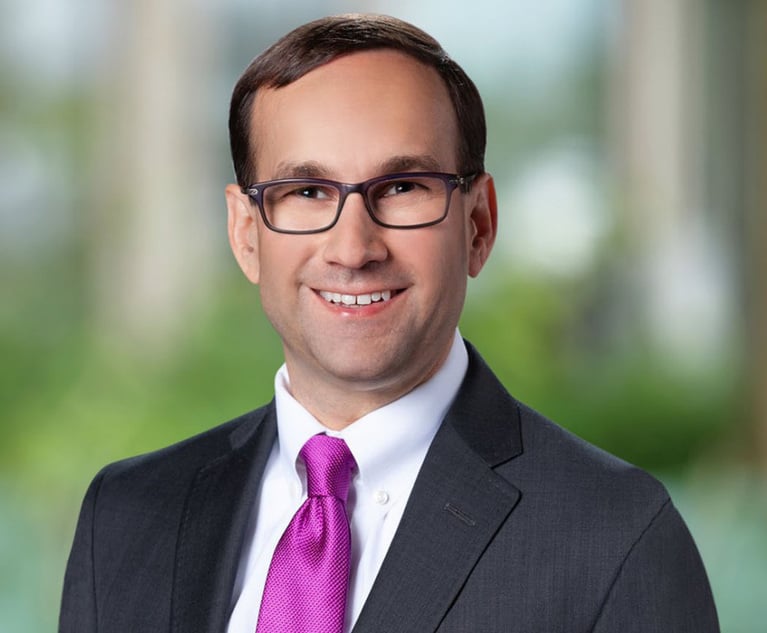The Opioid Onslaught: Indictments, Civil Suits Strike Fear in Hearts of General Counsel at Opioid Companies
Experts say the opioid crisis in America has damaged 2.4 million people, claimed 300,000 lives and has cost the country over $500 billion in economic harm.
September 30, 2019 at 01:00 AM
8 minute read

Experts say the opioid crisis in America has damaged 2.4 million people, claimed 300,000 lives and has cost the country over $500 billion in economic harm. The damage—and an urgent quest to place civil and criminal blame for it—has created a fearsome time for general counsel and chief compliance officers at many U.S. companies that make, distribute or sell the drugs.
Increasingly general counsel are having to deal with criminal investigations and indictments of their drug companies, and sometimes of their own roles. One example was the indictment in April of the Rochester Drug Co-Operative in New York along with its chief compliance officer. In July prosecutors arrested the chief compliance officer of Miami-Luken Inc. for allegedly helping the company to illegally sell millions of dollars' worth of opioids.
Equally prevalent are civil lawsuits against drug makers, distributors and large retailers. Upcoming federal multidistrict litigation involving about 2,000 suits against some two dozen companies is scheduled to begin in October, although settlement talks are underway. These suits have been brought by 400 cities, counties, states and others to recover money spent on dealing with the epidemic and its health effects.
 A man walks past a Johnson & Johnson sign in front of the company's headquarters in New Brunswick, New Jersey, Monday, November 7, 2005. Guidant Corp. sued to force Johnson & Johnson Monday to complete a $25.4 billion purchase of the troubled medical-devices maker and reported a plunge in quarterly profit..Photographer: Emile Wamsteker/Bloomberg News
A man walks past a Johnson & Johnson sign in front of the company's headquarters in New Brunswick, New Jersey, Monday, November 7, 2005. Guidant Corp. sued to force Johnson & Johnson Monday to complete a $25.4 billion purchase of the troubled medical-devices maker and reported a plunge in quarterly profit..Photographer: Emile Wamsteker/Bloomberg NewsIn a separate civil suit in late August, a county judge in Oklahoma ordered giant drug company Johnson & Johnson to pay $572 million to that state for its role in the crisis, citing false marketing strategies that misled health professionals and the public about the dangers of its drugs. Johnson & Johnson calls the ruling "flawed" and says it will appeal.
The company "did not cause the opioid crisis in Oklahoma, and neither the facts nor the law support this outcome," says a statement by Michael Ullmann, executive vice president and general counsel of Johnson & Johnson. "We recognize the opioid crisis is a tremendously complex public health issue and we have deep sympathy for everyone affected. We are working with partners to find ways to help those in need."
Indictments and Fear
The government wants in-house counsel to be scared, says Joshua Robbins, a former federal healthcare prosecutor and now chair of the white collar defense and government investigations practice at Greenberg Gross in Los Angeles. Robbins cites the federal government's press release in the Rochester case, which says it wanted "to send shock waves through the pharmaceutical industry" by indicting the company and two executives.
He noted that only a few executives were charged in both the Rochester and the Miami-Luken cases, and the chief compliance officer was among them. "That is not a random choice," he says.
"They want companies and compliance counsel to be afraid," Robbins continues. "There is an immense deterrent effect on any companies that would think about dismissing or minimizing their compliance obligations."
At least one company's history suggests the deterrence effect is not so immense. In 2007 Purdue Pharma and three executives, including its late general counsel Howard Udell, pleaded guilty to misbranding the opioid drug, Oxycontin. The three executives were banned from drug companies, seriously damaging their careers. Still Purdue Pharma remains the subject of lawsuits today.
As the Purdue Pharma history shows, it's not unprecedented to see the U.S. Department of Justice go after an in-house counsel or chief compliance officer. But Robbins says such action "is not typical, and I consider it to be pretty aggressive."
 Julie Myers Wood, CEO with Guidepost Solutions. Courtesy photo.
Julie Myers Wood, CEO with Guidepost Solutions. Courtesy photo.He adds that the recent indictments reflect DOJ's view "that perhaps a deliberate breakdown of the compliance function, knowing and willful, allowed companies to operate in violation of their regulatory obligations and to engage in conspiracies to distribute illegal products." Jacques Smith, national leader of Arent Fox's complex litigation group, agrees that the focus on individuals is a rising trend.
"The focus on individual accountability—as recently seen in DOJ's trend of going after executives of opioid drug companies—is not surprising," Smith says. "Individual accountability increased with the Yates Memo, was reinforced with some modifications under former [Deputy Attorney General Rod] Rosenstein, and has found permanence in the revised Justice Manual."
Other companies under recent DOJ scrutiny have negotiated their way out of criminal charges while reaching a civil settlement. In July, for example, DOJ announced reaching a nonprosecution agreement with the Reckitt Benckiser Group over sales and marketing of the opioid Suboxone. At the same time the government reached a $1.4 billion civil settlement which included the U.K.-based group and its subsidiary in New Jersey, Reckitt Benckiser LLC.
Civil Suits and "Abatement"
Unlike the criminal cases, the many civil lawsuits do not seek individual accountability as much as they demand money to cover the destruction wrought by opioids.
The Oklahoma decision came in the first civil trial of a drug maker over the damages caused by its painkillers. In following the tobacco litigation model, the suit sought $17 billion to cover the treatment and other services needed due to addictions in Oklahoma.
Judge Thad Balkman of Cleveland County District Court, however, lowered the amount to over half a million dollars as abatement for the damages caused by Johnson & Johnson. Before the trial, defendants Purdue Pharma and Teva Pharmaceuticals agreed to settle their parts in the case for $270 million and $85 million respectively, giving the state nearly $1 billion total.
The outcome in Oklahoma has no binding effect on other state cases nor on the huge multidistrict litigation before U.S. District Judge Dan Polster in Cleveland. Settlement talks are ongoing in that case at this writing.
In an unprecedented action, the Sackler family, owners of Purdue Pharma, has reportedly offered to give up ownership of the company and pay $3 billion for a global settlement that would end any new suits against family members or the company.
 Joshua M. Robbins partner with Greenberg Gross.
Joshua M. Robbins partner with Greenberg Gross.According to various news reports, the company would make its addiction treatment drugs free, and restructure itself in bankruptcy proceedings as a public beneficiary trust, with an estimated value of roughly $7.5 billion. The company declined comment.
The opioid plaintiffs face more legal barriers than the tobacco plaintiffs did, in the opinion of Stanford University law professor Michelle Mello, who is also a professor of health research and policy in the school of Medicine. She has authored numerous articles, including "Drug Companies' Liability for the Opioid Epidemic," recently published in the New England Journal of Medicine.
Mello suggests in her article that "persuading a jury that an opioid is defectively designed if the Food and Drug Administration approved it is challenging. Furthermore, in most states, a drug manufacturer's duty to warn about risks is limited to issuing an adequate warning to prescribers."
In addition, she states, some individuals contribute to their own addiction because they do not take opioids as prescribed or purchase them illegally. "Companies may argue that such conduct precludes holding manufacturers liable, or at least should reduce damages awards," the article says.
What's A GC To Do?
Regardless of the suit outcomes, experts suggest general counsel should remain vigilant. Attorney Julie Myers Wood, chief executive of Guidepost Solutions, a compliance solutions company in Washington D.C., says given the seriousness of the opioid crisis, she expects the government's heightened scrutiny of drug companies to continue.
Wood advises that companies give the general counsel or chief compliance officer a "safety valve" to express their opinions at the highest levels of the organization, including with the board of directors.
She also suggests that companies benchmark their compliance programs on a regular basis, and, "when overruling a chief compliance officer on a major matter, consider getting an independent compliance opinion about the appropriateness of the decision."
Wood adds, "Above all, it is critical to have a high quality and experienced chief compliance officer who has the trust of the C-suite. Absent this trust, the C-suite may too easily overrule or overlook a CCO or general counsel's opinion."
Robbins, the LA attorney, said he would advise in-house counsel at drug companies to "assume the risks are heightened. Government is sending a message to compliance counsel that they are more under the spotlight."
On the other hand, Robbins suggests in-house counsel can use the opioid notoriety to their advantage. "It certainly gives ammunition to fight back any efforts by management to discourage a strong compliance function," he says.
This content has been archived. It is available through our partners, LexisNexis® and Bloomberg Law.
To view this content, please continue to their sites.
Not a Lexis Subscriber?
Subscribe Now
Not a Bloomberg Law Subscriber?
Subscribe Now
NOT FOR REPRINT
© 2025 ALM Global, LLC, All Rights Reserved. Request academic re-use from www.copyright.com. All other uses, submit a request to [email protected]. For more information visit Asset & Logo Licensing.
You Might Like
View All
FTC Launches Inquiry of Single-Family Rental Home 'Mega Investors,' Issues PBM Report
5 minute read

Baker Botts' Biopharma Client Sues Former In-House Attorney, Others Alleging Extortion Scheme

People and Purpose: AbbVie's GC on Leading With Impact and Inspiring Change
7 minute readTrending Stories
- 1Uber Files RICO Suit Against Plaintiff-Side Firms Alleging Fraudulent Injury Claims
- 2The Law Firm Disrupted: Scrutinizing the Elephant More Than the Mouse
- 3Inherent Diminished Value Damages Unavailable to 3rd-Party Claimants, Court Says
- 4Pa. Defense Firm Sued by Client Over Ex-Eagles Player's $43.5M Med Mal Win
- 5Losses Mount at Morris Manning, but Departing Ex-Chair Stays Bullish About His Old Firm's Future
Who Got The Work
J. Brugh Lower of Gibbons has entered an appearance for industrial equipment supplier Devco Corporation in a pending trademark infringement lawsuit. The suit, accusing the defendant of selling knock-off Graco products, was filed Dec. 18 in New Jersey District Court by Rivkin Radler on behalf of Graco Inc. and Graco Minnesota. The case, assigned to U.S. District Judge Zahid N. Quraishi, is 3:24-cv-11294, Graco Inc. et al v. Devco Corporation.
Who Got The Work
Rebecca Maller-Stein and Kent A. Yalowitz of Arnold & Porter Kaye Scholer have entered their appearances for Hanaco Venture Capital and its executives, Lior Prosor and David Frankel, in a pending securities lawsuit. The action, filed on Dec. 24 in New York Southern District Court by Zell, Aron & Co. on behalf of Goldeneye Advisors, accuses the defendants of negligently and fraudulently managing the plaintiff's $1 million investment. The case, assigned to U.S. District Judge Vernon S. Broderick, is 1:24-cv-09918, Goldeneye Advisors, LLC v. Hanaco Venture Capital, Ltd. et al.
Who Got The Work
Attorneys from A&O Shearman has stepped in as defense counsel for Toronto-Dominion Bank and other defendants in a pending securities class action. The suit, filed Dec. 11 in New York Southern District Court by Bleichmar Fonti & Auld, accuses the defendants of concealing the bank's 'pervasive' deficiencies in regards to its compliance with the Bank Secrecy Act and the quality of its anti-money laundering controls. The case, assigned to U.S. District Judge Arun Subramanian, is 1:24-cv-09445, Gonzalez v. The Toronto-Dominion Bank et al.
Who Got The Work
Crown Castle International, a Pennsylvania company providing shared communications infrastructure, has turned to Luke D. Wolf of Gordon Rees Scully Mansukhani to fend off a pending breach-of-contract lawsuit. The court action, filed Nov. 25 in Michigan Eastern District Court by Hooper Hathaway PC on behalf of The Town Residences LLC, accuses Crown Castle of failing to transfer approximately $30,000 in utility payments from T-Mobile in breach of a roof-top lease and assignment agreement. The case, assigned to U.S. District Judge Susan K. Declercq, is 2:24-cv-13131, The Town Residences LLC v. T-Mobile US, Inc. et al.
Who Got The Work
Wilfred P. Coronato and Daniel M. Schwartz of McCarter & English have stepped in as defense counsel to Electrolux Home Products Inc. in a pending product liability lawsuit. The court action, filed Nov. 26 in New York Eastern District Court by Poulos Lopiccolo PC and Nagel Rice LLP on behalf of David Stern, alleges that the defendant's refrigerators’ drawers and shelving repeatedly break and fall apart within months after purchase. The case, assigned to U.S. District Judge Joan M. Azrack, is 2:24-cv-08204, Stern v. Electrolux Home Products, Inc.
Featured Firms
Law Offices of Gary Martin Hays & Associates, P.C.
(470) 294-1674
Law Offices of Mark E. Salomone
(857) 444-6468
Smith & Hassler
(713) 739-1250






